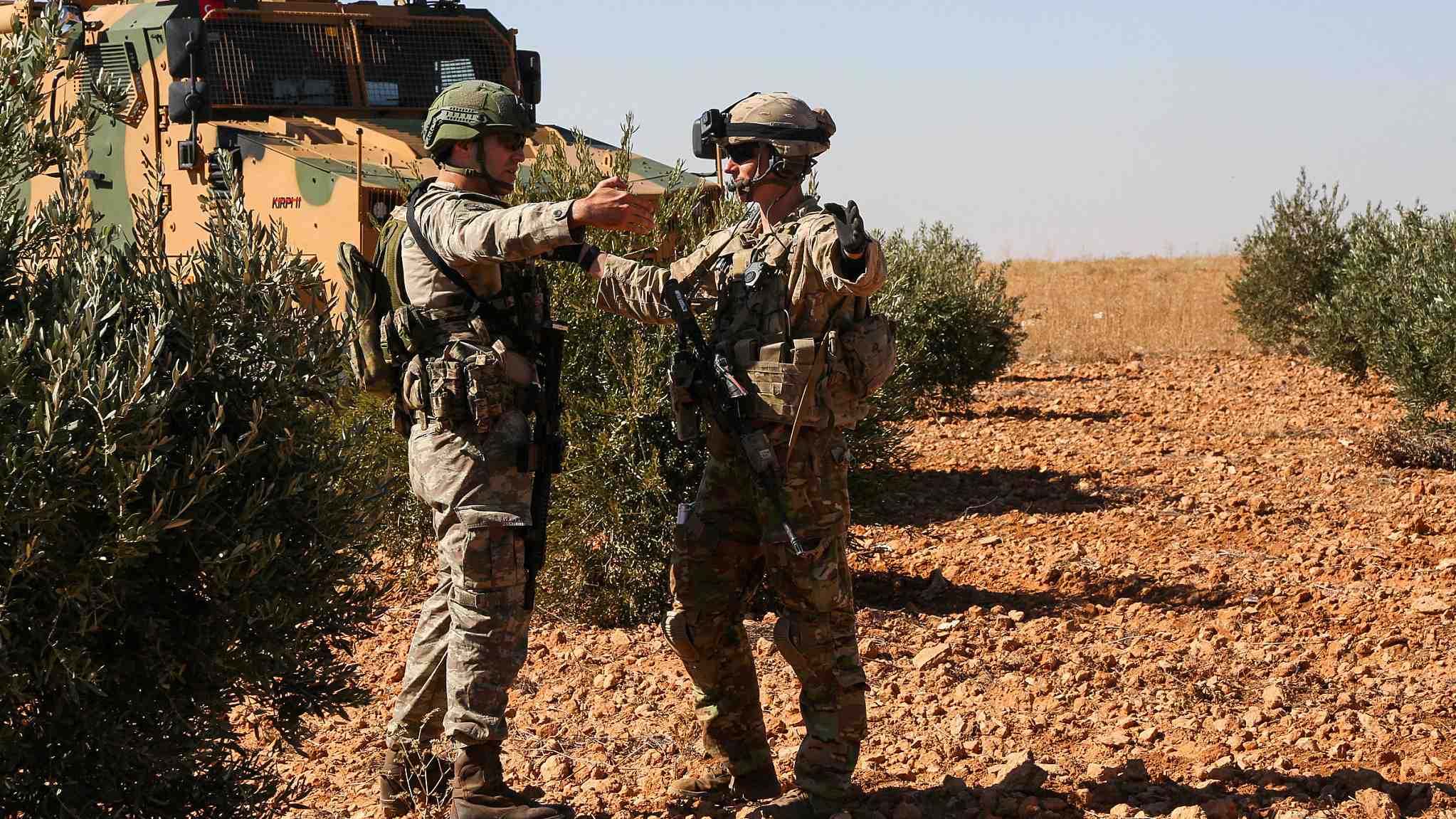Editor's Note: Martin Jay is a freelance journalist based in Beirut, Lebanon. The article reflects the author's views, and not necessarily those of CGTN.
Trump's recent announcement, which shocked Washington and the foreign policy herd of analysts in the Middle East, of pulling U.S. troops out from Syria is at best a confusing move and at worst an erroneous one, which leads many to suspect that it was driven by personal grievances and ideas, rather than logical ones.
If nothing else, it proves though that American troop in Syria were not there, under his watch, to destroy ISIL; it also proves that the so-called special relationship with Israel is not quite as special as many believe as the move has sent a shock wave of repercussions and fear towards Tel Aviv.
Additionally, it also shows that Trump is capable of extraordinary levels of petulance and juvenility when he doesn't get what he wants in the region: Saudi Arabia and its Gulf Arab partners did not ultimately deliver on the cash that Trump has been hinting they need to pay for U.S. troops to stay in Syria and the U.S. president, with one clean tantrum, throws the toy out of the pram, believing that he has scored a minor but important point with Riyadh.
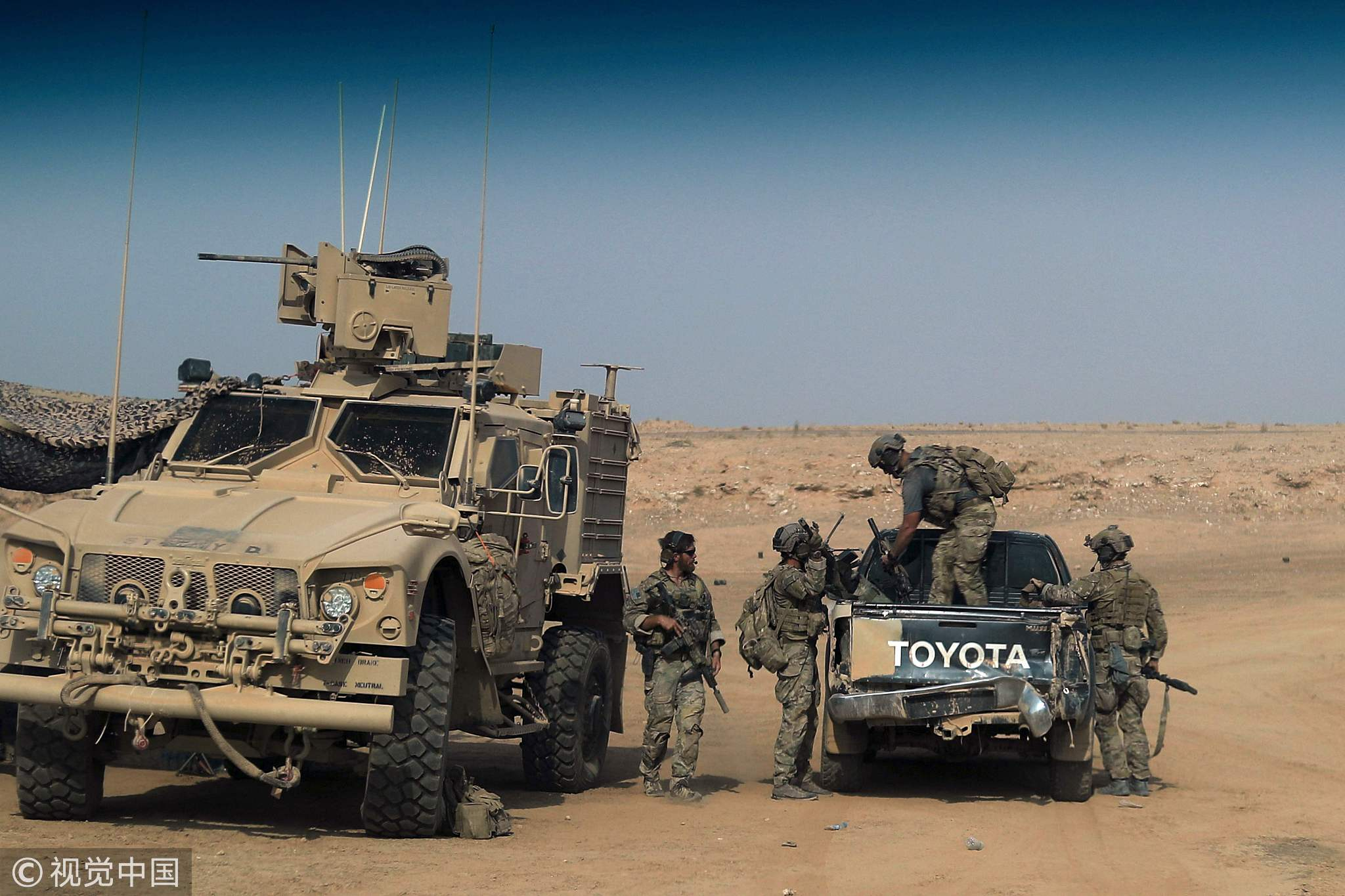
In this file photo taken on September 13, 2018 U.S.-backed forces are pictured near the village of Susah in the eastern province of Deir Ezzor, near the Syrian border with Iraq. /VCG Photo
In this file photo taken on September 13, 2018 U.S.-backed forces are pictured near the village of Susah in the eastern province of Deir Ezzor, near the Syrian border with Iraq. /VCG Photo
But it's not in Saudi Arabia we should be gazing for enlightenment, although the bellicose reaction will be seen poorly by the Saudi elite who are aware that Trump requires more from them, following the Jamal Khashoggi murder than mere words of support, with regards to oil production levels, sustaining U.S. arms sales and anti-Iran rhetoric, let alone cash for troops in Syria.
In the event, he got nothing from the Mohammed bin Salman (MBS) camp, which is beginning to regard him as a U.S. leader which they consider hard to ignore but well worth the effort.
Western media obsesses over the capricious love-hate relationship which Trump has with the Turkish president and makes some mileage in the argument that Erdogan has, at least, something to offer the U.S. president where the traditional allies have not.
And some might see the telephone call to Erdogan and the recent deal he has struck with the Turkish leader as a message to both Israel and Saudi Arabia “you are both my good friends and allies, but I can turn to your worst enemy for support if you don't step up to the mark”.
Trump's move has not only signaled that U.S. troops presence was really nothing whatsoever to do with ISIS, but more about regional hegemony and stoking the flames of insecurity – to assist America's arms manufacturers – and also having a presence there to vex the Syrian leader.
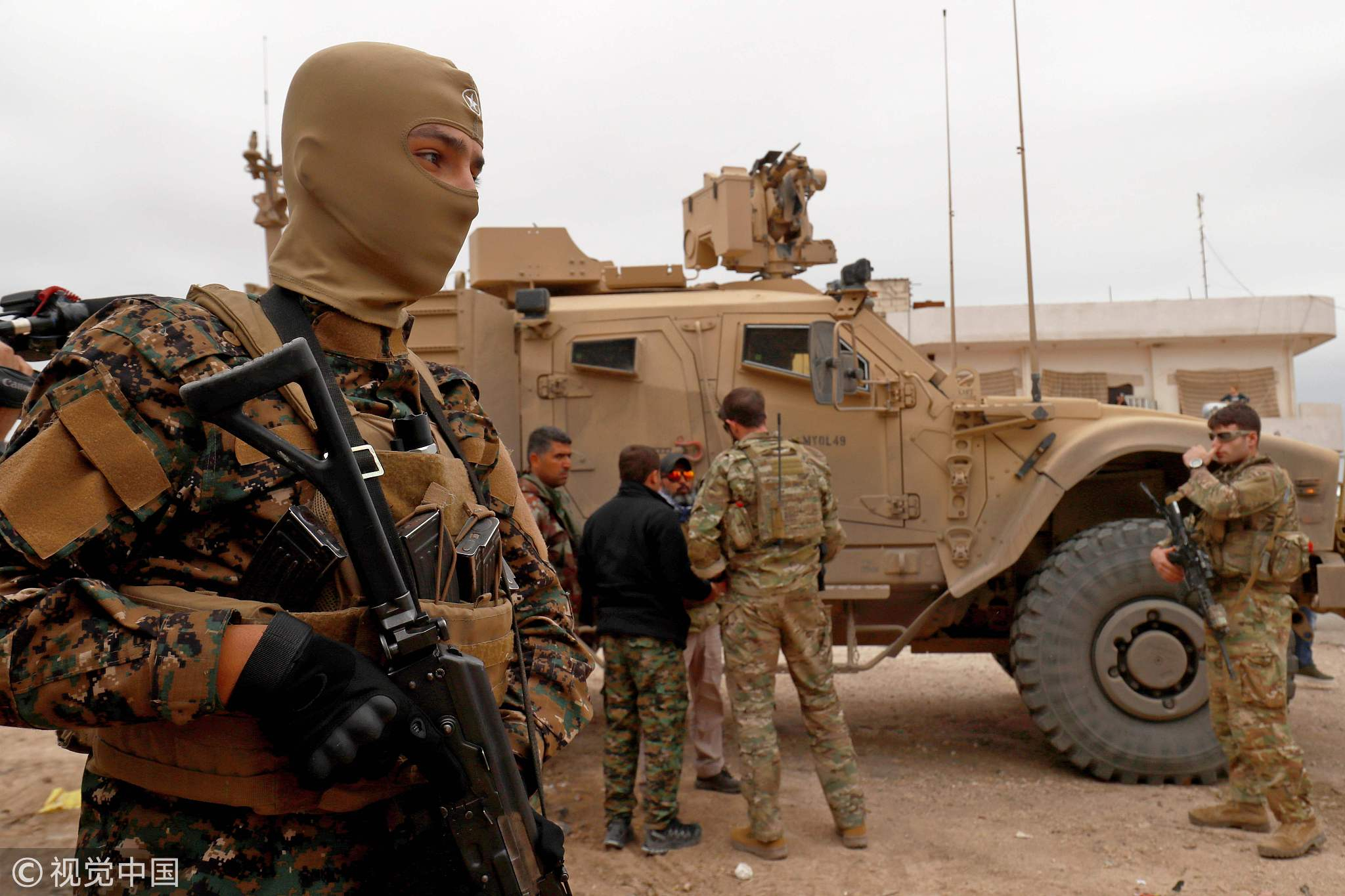
In this file photo taken on November 4, 2018, U.S. forces patrol the Kurdish-held town of Al-Darbasiyah in northeastern Syria bordering Turkey. /VCG Photo
In this file photo taken on November 4, 2018, U.S. forces patrol the Kurdish-held town of Al-Darbasiyah in northeastern Syria bordering Turkey. /VCG Photo
If the Saudis are going to cool down their arms buying frenzy and not pay for U.S. troops in Syria, then perhaps they need to be temporarily downgraded, is Trump's thinking. Turkey's dream of being a regional power can be used to annoy both Riyadh and Tel Aviv and to remind them that the free lunch is usually the most expensive one; special relationships actually require a lot of maintenance.
But it also sends a worrying message to the whole region in that Trump believes a more chaotic Syria, with a new war of sorts starting between Turkey and the Kurds, will give America what it needs in the short term: chaos where there was calm. Or at least that's what many geopolitical analysts believe.
Trump is closer to Obama on his thinking on the region than many like to admit. He has yet to come to terms with the fact that the farce of supposedly fighting ISIS terrorists in Syria, has resulted in Russia and Iran helping Assad win the war and come out of it not only a victory on the battlefield, but one also regionally, as the number of Gulf Arab countries now ready to open embassies in Damascus grows by the day. Even the Saudis themselves are reported to want to follow this trend.
Another argument would be that Trump really has given up on being a regional power and is accepting a new world order in the Middle East which is run by Turkey, Iran, and Russia.
This is the reality on the ground for many people in this part of the world and it is curious to see how the press coverage of Trump's decision puts so much focus on personalities–Erdogan chiefly but then the resignation of James Mattis shortly afterwards–but missed the most important one: President Rouhani of Iran.
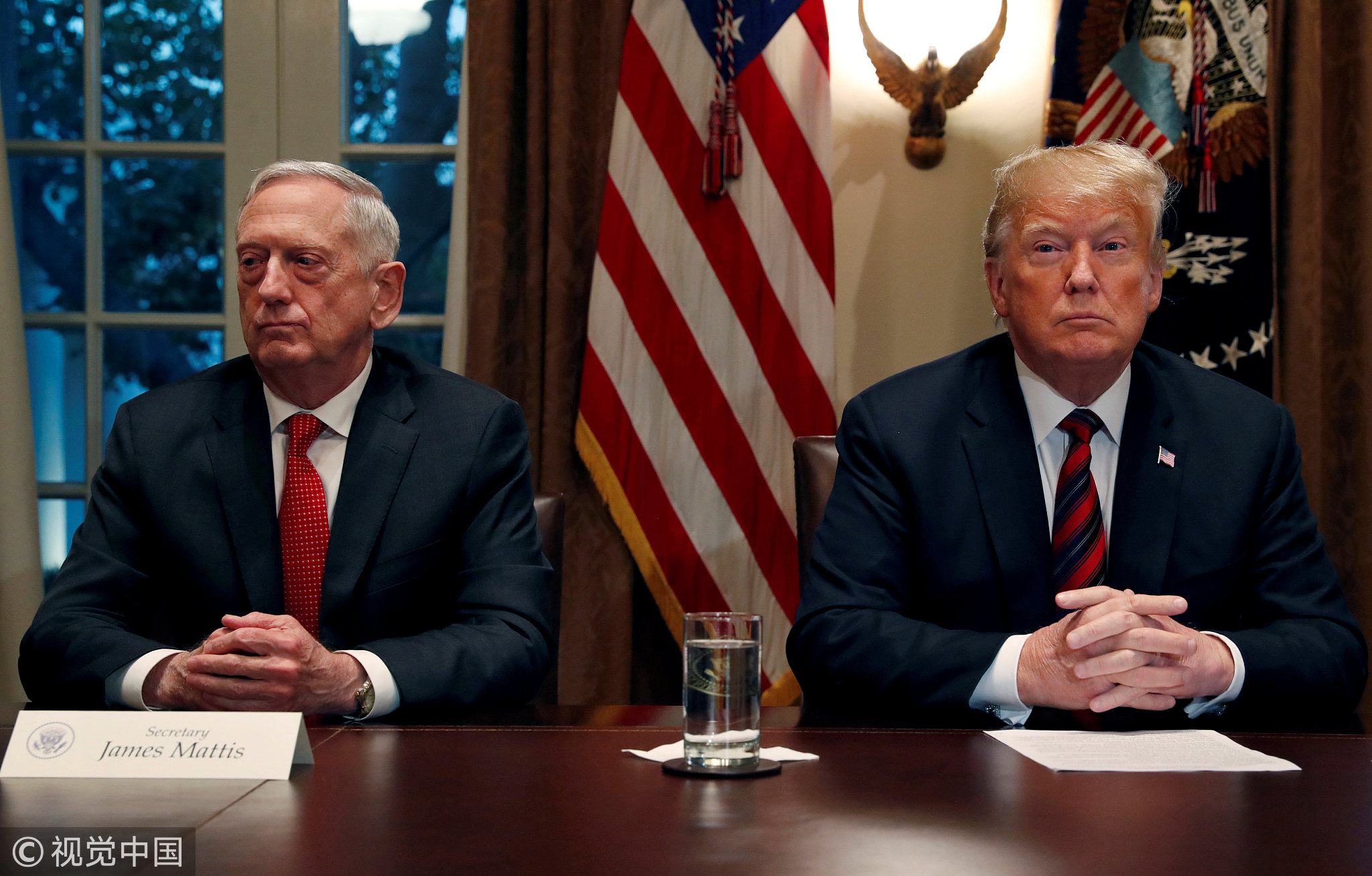
U.S. President Donald Trump speaks to the news media while gathering for a briefing from his senior military leaders, including Defense Secretary James Mattis (L), in the Cabinet Room at the White House in Washington, U.S., October 23, 2018. /VCG Photo
U.S. President Donald Trump speaks to the news media while gathering for a briefing from his senior military leaders, including Defense Secretary James Mattis (L), in the Cabinet Room at the White House in Washington, U.S., October 23, 2018. /VCG Photo
Rouhani's three-day epic talks with Erdogan, which followed the Trump phone call, are the real story. We know from U.S. media reports that Erdogan complained bitterly to Trump about the U.S. funding the Kurds, which he promptly accepted and then just caved in and said he would pull out. The decision was so capricious; it was almost like a child deciding at the last moment to not attend a friend's birthday party.
We also know that Erdogan has assured Trump that Turkey will take on the role of fighting ISIS, which is somewhat a ludicrous notion, given that once again it will no doubt be ISIS which will play a key role in helping Turkey attempt to crush the Kurds on its southern border.
More likely, many ISIS will join the ranks of other extremist groups which might even pay them to fight alongside the Turkish regular army. The Kurds themselves, now free from the shackles of U.S. servility, will no doubt begin secret talks with the Assad regime on how they can together defeat Turkey.
But in the midst of all this, where is Iran? What were the conclusions of those epic talks? Has Erdogan brokered a deal with Trump which takes the heat off MBS over Khashoggi, creates a new war in Northern Syria and one which reduces the presence of Iranian troops in Syria?
In the coming days we will no doubt find out. If this is not the case though, then his petulant if not banal move to withdraw U.S. troops from Syria, will be seen as an appeasement to Iran; an act which will reduce the heat on Tehran and fly in the face of everything that Mike Pompeo has established as a lucid, stoic policy towards regime change and/or obliterating so-called Iran deal on nuclear weapons.
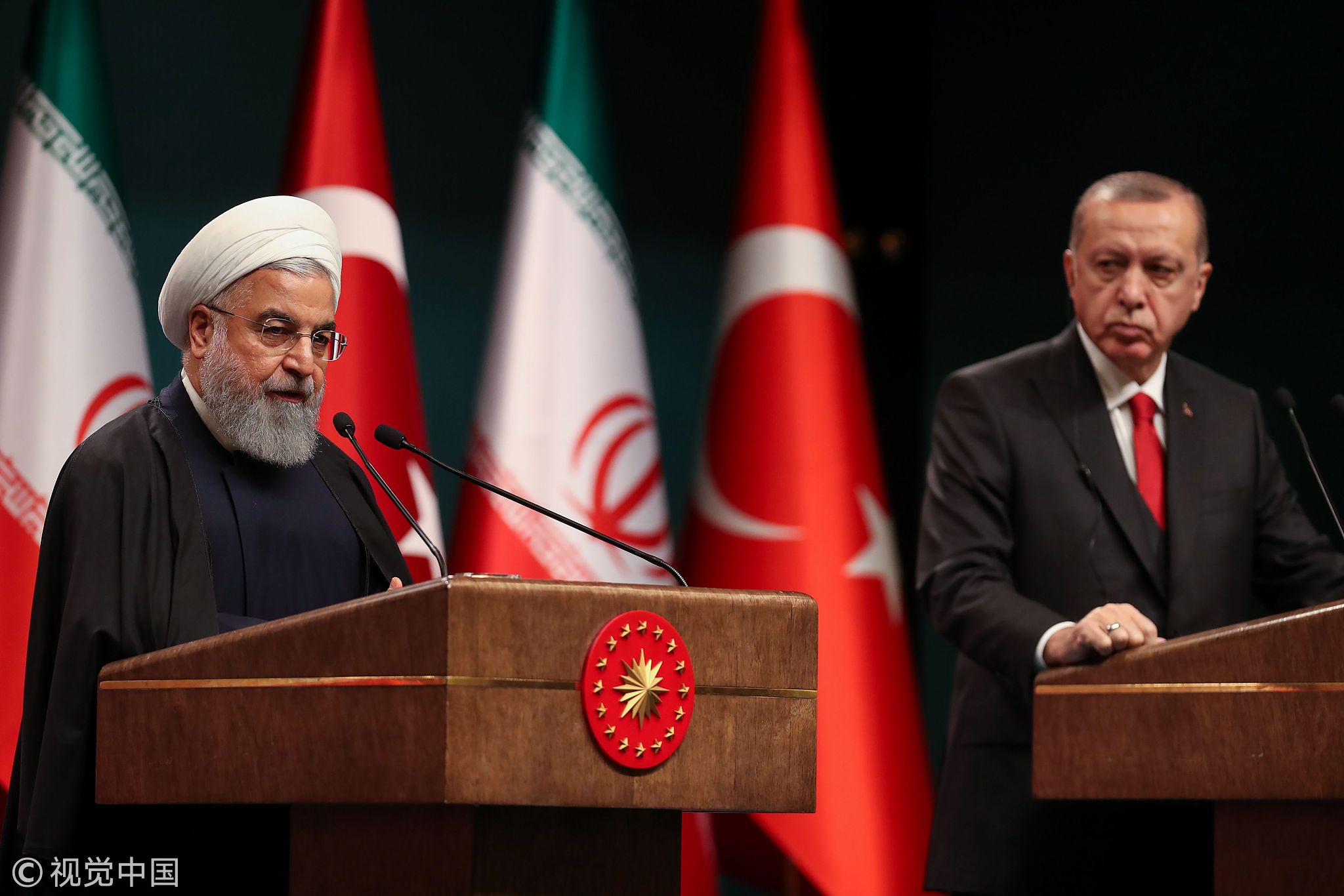
Iran's President Hassan Rouhani (L) and Turkey's President Recep Tayyip Erdogan (R) attend a joint press conference at the Turkish presidential complex in Ankara on December 20, 2018. /VCG Photo
Iran's President Hassan Rouhani (L) and Turkey's President Recep Tayyip Erdogan (R) attend a joint press conference at the Turkish presidential complex in Ankara on December 20, 2018. /VCG Photo
It also makes hawk John Bolton - who had earlier pledged that U.S. troops would only withdraw once Iran's had- look faintly redundant. Perhaps it is this immature, senseless behavior which was too much for James Mattis to take, which led to him resigning so swiftly. Who can follow Trump's whimsical foreign policy foibles and idiotic ideas?
But no one is more confused and left out in the cold than Israel, which has always been a surreptitious ally to the Kurds, and, notably, hates Erdogan and regards him as a regional danger, not because of what the conservative Israeli press refer to as an ‘anti Semite' but because he has the ability – if Trump assists him – of challenging the traditional hegemony of Saudi Arabia, with a little help from Qatar's cash and the Muslim Brotherhood ideology.
Israel may well even support the Kurds to fight Erdogan, which will place it on a collision course with Washington whose officials, stunned and caught off guard by this latest endeavor of Trump to get a better deal in the Middle East, will have to tackle as one of many new conundrums created by such call-center geopolitics.
Although the whole stunt may well have been orchestrated just to simply get rid of Mattis, who Trump has been hinting should leave for a long time, but never quite had the gusto to fire, expect a U-turn quite soon. And also expect a lot of articles in western media about ISIS regrouping and getting stronger in both Iraq and Syria.
(If you want to contribute and have specific expertise, please contact us at opinions@cgtn.com)

